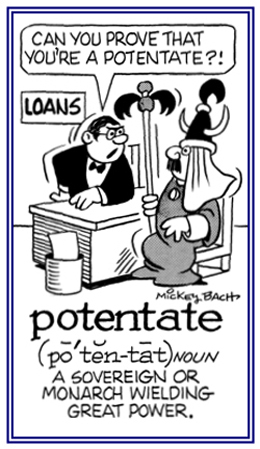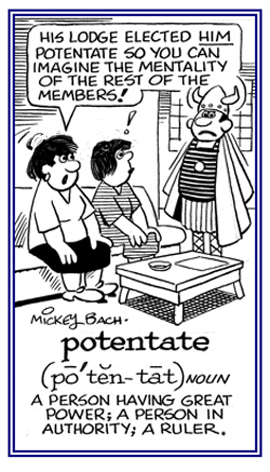poten-, pot-, poss-, -potent, -potence, -potency, -potential +
(Latin: power, strength, ability, able; having authority over; rule over, command of)
A pluripotent cell has developmental plasticity or pluripotent embryonic tissue.
A pluripotent cell is capable of affecting more than one organ or tissue.
The sheriff and his posse rode out to look for the bank robbers.
A posse is the body of persons that a peace officer of a U.S. county is empowered to call upon for assistance in preserving the peace, making arrests, and serving writs.
The assembled group is called a posse for short.
The name Posse Comitatus means, “the Power of the County”, bringing to mind colorful images of the old west county sheriff swearing in a posse to pursue fleeing criminals.
The Act was born out of the extensive use of federal troops for law enforcement in the South following the Civil War. Congress, recognizing that the long-term use of the Army to enforce civilian laws posed a potential danger to the military’s subordination to civilian control, passed the Act.
The 1878 Posse Comitatus Act made it a crime for anyone to use the Army to enforce federal, state, or local civil laws.
The prohibitions of the Act are directed at preventing the military from becoming a national police force or Guardia Civil. Accordingly, the Act prohibits anyone from using the military to “execute the laws". Execution of the laws includes the arrest or detention of criminal suspects, search and seizure activities, restriction of civilian movement through the use of blockades or checkpoints, gathering of evidence, and certain uses of military personnel as undercover narcotics officers.
In essence, the closer the role of the military personnel comes to that of a police officer on the beat, the greater the likelihood that the Act is being violated.
Military Involvement During National Emergencies
The frequency with which the military has become involved in civilian law matters has varied throughout our history, typically reaching high points during times of national emergency. The difference in the 1990’s; however, has been to increase the routine use of the military in domestic law enforcement activities during a period of relative national calm and security.
Statutes and regulations enacted in the past decade permit the use of military personnel in drug interdiction, and immigration enforcement.
Although such involvement is supposed to be “indirect” under those statutes, the reality is that armed active duty military personnel are carrying out an enforcement activity that brings them into direct contact with criminal suspects.
The fact is that the political interest in stopping drug and alien smuggling is currently greater than the concern as to whether the military is being injected into a traditional civilian law enforcement role contrary to the principles upon which the Posse Comitatus Act was founded.
The military possesses unique training and equipment advantages in this arena that cannot be duplicated by civilian law enforcement. The fact that the National Guard is not subject to the Posse Comitatus Act while in its state status also provides a great deal of flexibility to planners for homeland defense.
National Guard Troops May Be Employed in Law Enforcement
National Guard troops may be actively employed in law enforcement activities in addition to their military specialty. While to the untrained eye the distinction between a BDU (Battle Dress Uniform) clad Army Reservist and a BDU clad National Guardsman may be nonexistent, the legal distinction between them is significant.
During a natural disaster Army reservists or Guardsman may both provide logistical aid such as water purification, medical assistance, and communications; however, due to the Posse Comitatus Act, it is only the Guardsman in his/her State status that can take an active role in suppressing looting and in providing general security for an area that has lost effective law enforcement control.
Constitutional Authority of the President Allows Utilization of Military to Preserve Civilian Laws
By virtue of the several statutory exceptions to the Posse Comitatus Act in the past decade, coupled with the general Constitutional authority of the President to preserve order, there are few areas of domestic law enforcement activity where the military is precluded from participating in times of national emergency or disaster.
While the Posse Comitatus Act still serves a valuable function in deterring a lower level commander or politician from engaging in unauthorized “police” activity using military forces, the Act today provides little hindrance to the National Command Authority in executing civilian laws in times of emergency through military personnel.
Through proper, legal declarations of Presidential emergency authority and/or through the use of National Guard assets in state status, it is increasingly likely that the military will play a significant enforcement role in response to domestic terrorism and other disasters for the foreseeable future.
2. To have as a quality, characteristic, or other attribute: Shirley possessed great tact and politeness.
3. To acquire mastery of or have knowledge of: Harry possessed valuable data that his employer was looking for.
4. To gain or exert influence or control over; to dominate: Jim thought he possessed his wife, but he was wrong because she divorced him within a year of marriage.
5. To cause to own, hold, or master something; Mr. Black possessed the property, but he was not the owner of it.
Professor Hathaway possessed a great amount of knowledge in the field of astronomy. .
6. To cause to be influenced or controlled: The idea of going on a trip to California to see his relatives possessed Sam so much that he decided to go there in the summer.
His agitated emotions towards his father totally possessed him.
7. Etymology: from Middle English possessen; from Old French possessier, from Latin possessus, past participle of possidere, "to possess"; which stands for pots, "mighty, powerful" + sidere, literally "to sit as a master".
2. Something that is achievable: The possibility of going to the Alps sounded like a good idea for the summer.
3. Potentiality for favorable or interesting results: The idea has great possibilities.
2. Capable of occurring or of being done without offense to character, nature, or custom: Jane inquired about the best possible care in the retirement home.
3. Concerning something that is capable of favorable development; potential: The weather forecaster said that there could be possible sun during the next days.
4. Pertaining to something that may be true or may be the case: It is possible that Mr. Todd has already gone home.
5. Descriptive of an uncertain likelihood; without any guarantee: It is possible that Joe will come to visit, but he doesn't know if it will work out.
2. Pertaining to how something occurs or is done without offense to character, nature, or custom: It said in the newspaper that the man possibly murdered his wife.
3. Descriptive of how some favorable development might take place: The children might possibly meet their friends at the beach in the afternoon.
2. The condition of being powerful or the strength of something: The potency of the garlic cooking in the kitchen was overwhelming!
3. Capacity to be, to become, or to develop; potentiality: The seeds are known for their potency and, when good soil is used to plant them, the flowers should grow wonderfully.
4. A person or thing exerting power, influence, or authroity: There are different kinds of potencies including power of appointment, the authority of a lord, and carte blanche.
2. Cogent; persuasive: Several potent and convincing arguments were in Greg's favor.
3. Regarding something that produces powerful physical or chemical effects: Tom used a potent and strong drug.
4. Concerning the condition of having or exercising great power or influence: The higher interest rate was a potent factor in the economy.
5. Descriptive of something that has a strong or sharp taste: Some cheeses are very potent, like Canadian Cheddar, manchego, and parmesan.
2. A person who dominates or leads a group or an endeavor: There are many industrial potentates who make significant decisions for their companies.
3. Etymology: from Latin potentatus, "rule, political power" from Latin potens, "powerful, strong."


Go to this Word A Day Revisited Index
so you can see more of Mickey Bach's cartoons.
2. A capacity for growth or development: In physics, the potential refers to the work that is required to move a unit of positive charge, a magnetic pole, or an amount of mass from a reference point to a designated point in a static electric, magnetic, or gravitational field.
3. Etymology: from Latin potentia, "power."




